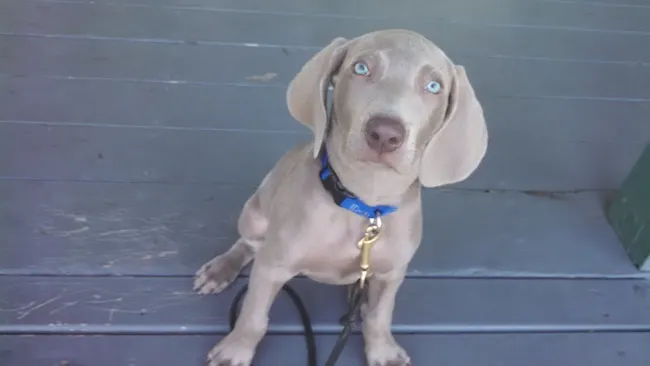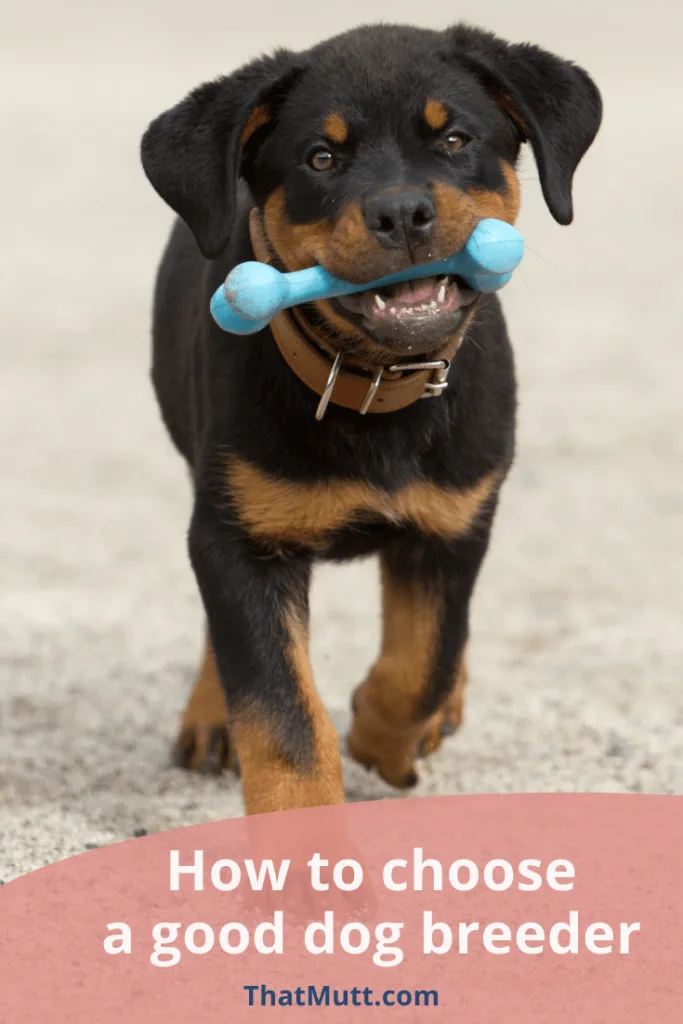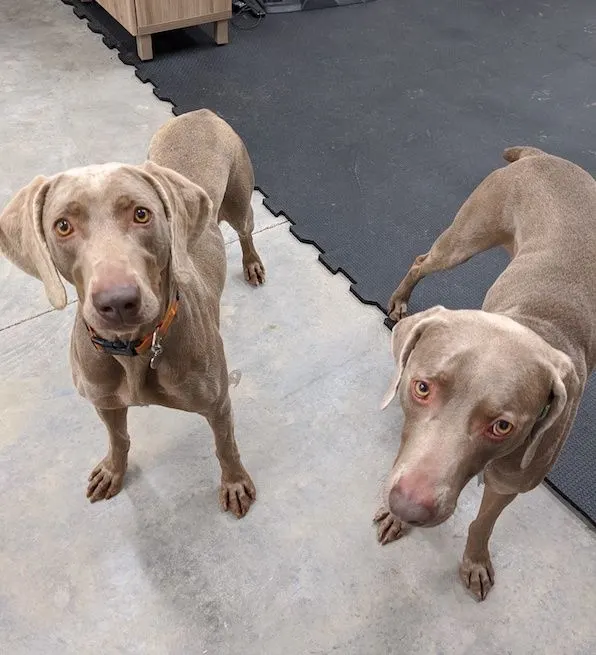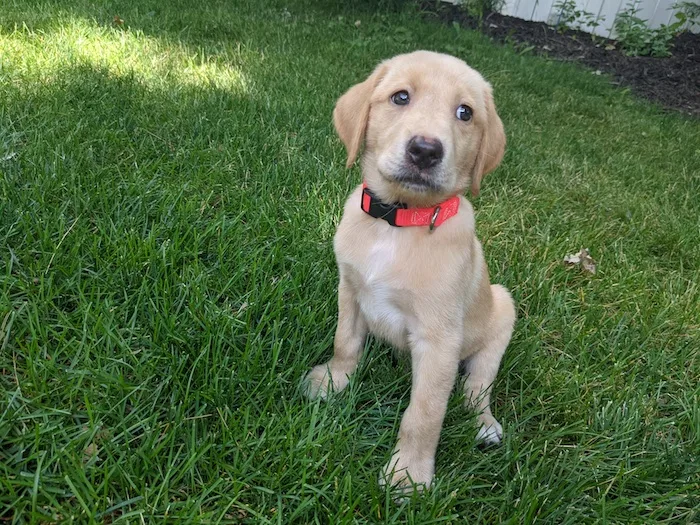This article is focused on how to choose a dog breeder but adopting a dog is also a good choice.
I want you to do what is right for YOU and not what anyone else says you should do. You should get the dog or puppy you want.
I will say, it’s overwhelming searching for a dog in 2021!
I’m helping my parents find a dog and the shelters are nearly empty in some areas while breeders have long, long wait lists. Plus, the puppy scammers are out in full force on Craigslist!
There is a high demand for dogs!
I’m glad I chose our breeder over a year ago. I will be picking up my yellow Lab puppy later in July!!
This article is about my personal opinions on how I chose the right dog breeder for me.
Us dog people can be very opinionated, even snobby, about where we get our dogs. So just know that these are simply my personal preferences. They don’t have to be yours.
If you’re looking for a good breeder, use this article as a general guide in your ongoing research.
Please leave a comment to let me know what you value or don’t value in a breeder. I think this topic is very interesting (nerd).
How to choose a dog breeder
First, here are three basics for how to choose a dog breeder. These are pretty obvious but important to think about.
- Know what breeds you’re considering
- How far are you willing to travel for a puppy?
- What are you willing to pay for a puppy?
1. Know what breed or breeds you’re considering.
I started my serious puppy search in March 2020. This was after I made the difficult decision not to adopt the adult weimaraner I had seriously considered.
When I began thinking about puppies, I knew I wanted another athletic sporting breed who would hopefully enjoy running, hiking and agility.
I chose a field-bred Labrador because they are athletic but not quite as intense as a weimaraner.
I love Remy’s energy but he’s a bit off the charts.
I thought it would be wise to choose a slightly less crazy dog to add to our family.
I figured even a higher-energy Lab would seem “calm” to me since I’m used to a weim. I guess I’ll have to update you on that in a few months to see if I’m right!
I wrote a pretty lengthy article on how I chose the right dog breed.
Basically, I listed out what I was looking for in a dog and prioritized them in this order:
- Trail running buddy
- Friendly with dogs, kids, cats and strangers
- Able to train for agility
- Has an “off switch”
- Calm at breweries, patios and travel
- Sticks close off leash
- Able to train for hunting
- Large or medium breed
- Short or medium coat
Your list will be very different than mine but it really helped me to make that list.
2. How far are you willing to travel to get a puppy?
If you are not willing to drive out of state, that is fine but it will limit your search. In some ways, that makes choosing a breeder a lot easier because it narrows your options.
I found a local Lab breeder I liked but ultimately decided to travel out of state for a breeder that I thought was even better. I was open to traveling to several states but did not search the whole country.
Keep in mind it’s relatively easy to fly with a puppy in the cabin with you if you decide to get a puppy out of state.
3. What are you willing to pay for a puppy?
For many breeds, you will need to be open to paying at least $1,500. It’s common to pay double that or more.
After talking with 9 different breeders I think I just became desensitized to the price and just understand that that’s what you have to pay for a puppy these days!
For me, the price is worth it but we all have our own opinions and limitations.
What is important when choosing a dog breeder?
I recommend you list out what is important to you and what is not so important.
Below are my lists to give you an example.
I would expect your lists to be different than mine.
What is important to ME in choosing a good dog breeder?
1. The breeder views the dogs as members of the family. This is most important to me. All of the sires and dams should be loved, valued family members.
They don’t necessarily have to live in the house but that would be ideal. I like to know the breeder does activities every day with each dog and works on training. I want to see that the dogs are doing the work they are bred to do.
2. Health testing of the parents and grandparents. This is just such a common, basic practice. If the breeder is not doing the typical health testing of that breed then I’m going to look elsewhere.
But also keep in mind that I’m getting a Lab – the most popular breed in the U.S. and one that unfortunately can have a LOT of health problems.
3. Dogs are bred for work. I want a dog that is athletic and able to do the work he is bred to do.
4. The dogs’ temperaments are a priority. The breeder is factoring in temperament and trying their best to produce puppies that have a certain temperament.
5. The breeder provides lots of socialization for the puppies.
6. Transparent in their “philosophy.” They are proud to talk about how they raise their dogs, the activities they do together, how they socialize their puppies, show pictures of their facility on social media, etc.
7. Keeps a wait list for puppies. Shows they are in demand.
8. Good communication. The breeder should respond to emails within a few days and be friendly and polite.
9. Pedigree available. This allows you to see who the parents, grandparents and great-grandparents are. All this really shows you is their names, what titles they’ve earned and what kennels they came from. But you can ask the breeder for more info on the health of these dogs if you’d like.
10. Some sort of health “guarantee.” I realize you truly can’t guarantee some health issues but having a 1-year or 2-year guarantee for certain health issues is important to me.
11. Willing to take the puppy or dog back. I would not expect a refund, just that they would be willing to take the dog back at any time for any reason.
12. Willing to provide references. I emailed references of the breeder we chose and they all gave glowing reviews. I tried to find anything negative and I could not.
13. Online reviews available. These can be very telling! Check out Facebook and Google reviews. But some breeders are small and won’t have any reviews. That’s understandable.
14. The breeder is an ongoing resource. It’s important to me to be able to contact the breeder in the future for questions about health or training or just life in general with the breed.
And this goes without saying, but obviously I would also expect the puppies to have at least one round of vaccinations and de-worming before going to their new homes.
What is NOT as important to me when choosing a dog breeder

These factors might be important to you but they were not important to me.
1. Whether or not the dogs are “show” quality. I don’t like the look of the Labs that win in dog shows. They might be healthy and meet the current breed standard but to me they appear overweight and incapable of working.
2. Which colors are available. For example, our breeder has no chocolate Labs.
3. Able to meet the puppy’s parents. This is often listed as a top priority when choosing a breeder and it’s just not realistic these days. Sometimes the breeder doesn’t even own both parents.
4. The breeder requires the dog to be spayed or neutered. A lot of breeders will require you to sign a contract saying you will not breed your dog and you will get the pup spayed or neutered at a certain age.
This is OK with me although I prefer to wait until a certain age before altering a dog for health reasons.
I’ve found that these contracts are often negotiable. And to be honest, they’re not enforced. But I would choose to honor a contract that I sign.
5. The breeder registers the puppies with the AKC. I would prefer the pup to be AKC registered but what matters most to me is the actual “family tree.”
Note that there are many other registries for dog breeds such as the United Kennel Club, the North American Versatile Hunting Dog Association and specific breed registries such as the American Border Collie Association.
6. Whether or not you get to pick your own puppy. This is very important to a lot of people but not to me.
Remy’s breeder and now our Lab breeder both match the puppies up with the buyers. I’m fine with that as the breeder is the one spending time with the puppies every day.
7. Meet the breeder in person before paying a deposit. This would be nice but with social media I felt I didn’t need to see the facility or meet the breeder in person until puppy pickup.
8. Paying the breeder a deposit to hold a puppy. This is pretty much standard these days. You pay a non-refundable deposit before the puppies are even born.
9. The breeder is making a profit on the puppies. I’m OK if the breeder is running a business and making money off of the puppies as long as I’m comfortable with everything else. Many breeders do not make money though.
10. The breeder’s website was built in 1999. A lot of breeders have very old, outdated websites and you shouldn’t judge them on this! This is just the way it is and it’s pretty common! Haha.
As long as they have a working email and phone number, that’s what counts. A lot of them have an active Facebook page.
11. The breeder will ship puppies by air. I don’t like this policy but I’m OK with it if the breeder is comfortable doing so. They have more knowledge than I do about shipping live animals.
How to find a good breeder
1. Searching online for dog breeders. I found breeders through searching online. I started close by with “Montana Lab breeders” and “Montana vizsla breeders” and slowly moved to other states.
I moved on whenever the breeder had a “pay now” button on their site. I want a breeder to be selective about who gets one of their puppies.
I also take a step back if they have puppies available immediately since most breeders have wait lists at least 6 months out. Although, it’s not impossible to have puppies available immediately – a lot depends on the breed.
I appreciate it when the breeder wants to know a lot about me and my lifestyle so they can match me up with the right puppy or recommend a different breeder.
I move on when they say, “Puppies are ‘this much’ and ready on ‘this day'” without asking me anything else first.
2. References from friends and family. Obviously a good place to start. If someone you know has a dog you like, find out where they got the dog.
If that breeder is no longer breeding dogs then they still might be able to connect you with a relative of the dog or a breeder with similar values.
3. Visit dog shows or dog sporting events. Especially if you know you’re going to do agility or hunt tests or obedience or whatever, this is a good way to see a variety of dogs.
When you see a dog you like, ask the handler where they got the dog. Most people love to talk about their dogs when asked.
How to adopt an adult dog from a breeder
Adopting a retired breeding dog or a dog that didn’t work out in the breeding program will often make a very nice pet.
These dogs are usually well socialized, especially if they have gone to dog shows or any type of dog sporting events. And they’re not always “old” dogs. Sometimes they’ve had just 1 or 2 litters or no litters at all.
Some breeders probably have a waiting list of people interested in adopting their retired dogs. If you are interested in this option, I recommend you email a couple of breeders and simply ask.
Enough from me! In the comments, I’d love to hear your opinion on how to choose a dog breeder. What am I missing?
How would you choose a a dog breeder?
Let me know in the comments below!
I purposely chose not to share which breeders we’ve purchased a puppy from because I didn’t tell them I would be writing this article. But if you are interested, you can email me at Lindsay@ThatMutt.com.
Lindsay Stordahl is the founder of That Mutt. She writes about dog training, dog exercise and feeding a healthy raw diet.





Taylor
Thursday 24th of August 2023
I'm considering getting a puppy from an American Bully breeder for my kids because I believe it can be a wonderful addition to our family. American Bullies are known for their friendly and gentle nature, making them great companions for children. Plus, it can be a great opportunity to teach my kids about responsibility and care for another living being. It's good to be aware that you will need to be prepared to spend at least $1,500 on several breeds, but it's typical to pay twice that amount or more.
https://southeastbullykennels.com/american-bully-breeder
Olivia Smart
Wednesday 26th of October 2022
Thank you for explaining that it's important for the breeder to be able to show you the pedigree. My sister has been thinking about getting a goldendoodle for her kids this Christmas. I'll have to share this with her while she looks for a breeder.
Denise
Thursday 7th of July 2022
Perhaps you could eventually publish an article on a topic slightly related to this: Finding a breeding partner for your dog.
I've got a wonderful full-breed (AKC registered) border collie and I think he would produce fantastic puppies. He's smart, handsome, healthy, and has a great temperament. Would love to see all of that perpetuated in the breed rather than the nervous wreck with skin problems I got from a different "breeder" 10 years ago (now I suspect she may have been more of a puppy mill than a real breeder). Plus, I'd like one of his offspring for myself. :)
I don't know where to start, though. How do I even find a breeding partner? What should I look for in the bitch and breeder (some of this you already went over here)? Should I have him tested for anything to make sure he's truly a good, healthy sire? What kind of financial transaction can I expect, if any? Am I hiring him out as a stud or is this purely for my one puppy?
Just some ideas and questions you might consider for a future post, since this one was already so helpful.
Lindsay Stordahl
Sunday 10th of July 2022
Interesting idea!
Deborah Maturi
Thursday 8th of July 2021
Hi, That was a great post! I actually never thought of the grandparent's background! Please follow me back if you would like, I started a new blog..Keeperofthefarm.com Thank you!
KL
Sunday 4th of July 2021
I have SO many thoughts, which I am sure is not at all surprising!
Health testing appropriate for the breed is basic. I really prefer to see the breeder also do a careful study of prospective pedigrees for what’s actually going to be a good match (both for what can be seen and for what may be unseen). My breeder picks up the phone and actually talks to the owner and/or breeder of the potential stud so she can understand if this dog who is amazing on paper would complement her female. And it’s not a knock on the dog if he won’t - it’s just about making a good choice for the future of the breed. Unfortunately, no matter how careful breeders are, they still depend on the good faith of others to an extent, and these are also living beings, so nothing is perfect. But a thorough, knowledgeable exploration into the pedigree before the breeding is ever made will go a long way and that’s what I’d like to see.
Titling appropriate for the breed and line type. For my American show line GSDs, you bet I want to see show championships up both sides of that pedigree! For a working line GSD, I’d want to see IGP titles on both parents and preferably on all dogs up the pedigree also (I’m told it’s not uncommon for the dam to not be as highly titled, but I would give major points to a breeder who did title their females). I want to see that the stock are proven in the venue of which they were bred to be part. Ideally there would also be show ratings on working line dogs and some performance titles on show line dogs. But it truly depends on the historical function and present day role of the breed you’re looking at, and the conventional practices among breeders.
Temperament can kind of follow from the titling aspect, but just because a dog is titled doesn’t mean the temperament is good (or even if it’s stable, it doesn’t mean that the overall goal of the litter is right for your situation). The training and trialing process to get the title will tell you so much about who your dog is. I learned that firsthand training and trialing my first dog. If I’m ever fortunate enough to have a dog who is potentially worthy of being part of a breeding program, I’m putting a lot of emphasis on that training and trialing process to tell me about the dog’s strength and weaknesses because no dog is perfect. Breeding for stable temperaments should be the very lowest bar set (and unfortunately a lot of breeders don’t meet that), but breeding with true knowledge of their dogs’ temperaments is that extra step and I want to see that if I can.
And from that follows goals. What kind of dog do you want? Sports? Work? Show? Family pet? Therapy dog? Some combination? Every breeder’s emphasis, preference, priorities, and even interpretation of the breed standard is going to be slightly different because each breeder is an unique human being. I like to look for someone who is doing what I want to do, or who is breeding something similar to what I want to do. But I also point people who ask me about breeders to the local breed club because “I like what I like, but that might not be what YOU like.”
Most importantly, listen to your intuition. Can you trust your breeder? That can be just as important as the tangible items on your list, because I think too many people get caught up in whether they think their breeder does everything right. Plenty of really mediocre or even bad breeders look good on paper. Look at how they show up when something goes wrong (the references Lindsay mentions can be great for that, but also meeting owners of the dogs at events - people may speak more candidly if they’re not on tap to give references). Can you ask about things you don’t understand and do the responses pass your sniff test? Do you feel like they really understand your goals and concerns for the dog and do you think they’ll make a good match? I want the breeder to choose my puppy for me, but I have to trust them for that to work. So I work off the rule that if I cannot trust them, I shouldn’t be buying one of their puppies.
KL
Friday 9th of July 2021
I thought you touched on the titling stuff! I have owned show line dogs, so the conventional titles are different from field labs.
Super excited for you and can’t wait for stories and pictures!
Lindsay Stordahl
Sunday 4th of July 2021
I was hoping you would chime in! Haha. Thank you, I read your comment with a lot of interest. I also look for titling appropriate for the breed and line type. I didn't have that on my list but that is important to me as well. For me, it's field trials and hunt tests that are important to me for Labs and weims. Although Remy's breeder does breed for both show and hunting, which I admire and must be challenging.